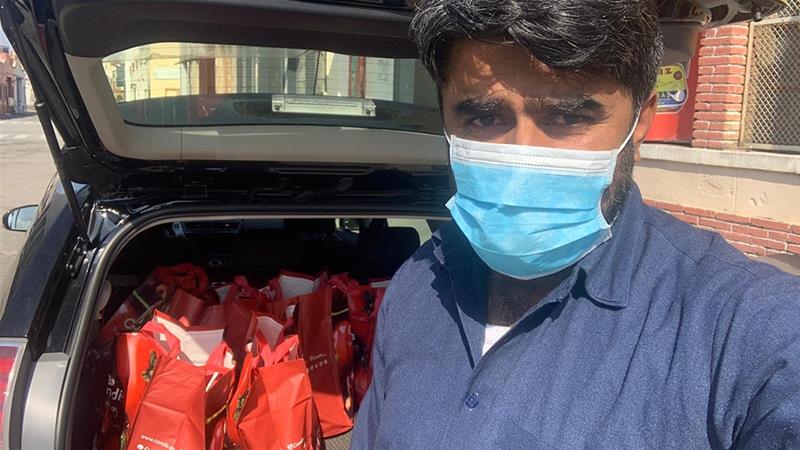Barcelona, Spain – When Sheraz Syed returns home from his working day, he cannot hug his three children or his wife, because of the coronavirus. Being a taxi driver these days is a high-risk job. But on top of his regular work, along with 195 Pakistanis in Barcelona, he provides free rides to healthcare staff in the city.
The initiative started at the beginning of Spain’s lockdown, in mid-March, as six Pakistani taxi drivers led by Shahbaz Ahmed discussed how medical workers would be able to return at night to their homes.
Since then, their effort has expanded to about 200 volunteers, including some drivers from other nationalities.
They started by sharing their contact details with hospitals and organised their schedules to cover the city centre and more remote facilities, such as the Can Ruti Hospital.
“Medical staff work too many hours and we saw that they were going to their jobs using public transport,” said Asim Gondal, a driver volunteering his services.
“For this reason, as they are working on the frontline for humanity, we began this service also to save them more time and, in this way, they don’t spend it on public transport.”
Gondal and his family have lived in Barcelona for about 20 years and Spain, he said, a country he now considers home.
“This is a difficult time for Spain,” he said.
About 43,000 Pakistanis live in Barcelona, and almost 89,000 in Spain overall, according to the Spanish Statistical Office.
The drivers follow preventive measures: they wear masks, gloves and have disinfectant gel in their cars.
None of the people in the group have the virus, but there have been previous cases of Pakistani taxi drivers with COVID-19.
Five are reported to be recovering in hospital.
“It’s frightening when your workmate is at the hospital. Some are my friends and they have eaten in my house,” said Syed. “There is always a risk.”
In an effort to limit the spread of the coronavirus, the Metropolitan Area of Barcelona (AMB) has limited taxi traffic to 20 percent each day and each driver is allowed to work once a week.
“We will provide this service until we can,” said Gondal.
Like many in Spain, which is facing a severe economic downturn as thousands have been laid off, the coronavirus outbreak has impacted the drivers’ personal finances.
“We don’t have any economic help from the government and only self-employed workers are able to work, the rest have been fired,” claimed Syed.
This has impacted their personal protection; not all taxi drivers can afford a screen to separate them from their passengers.
In addition to the taxi drivers’ inititative, over the past two weeks, the local Pakistani community has stepped in to help.
Grocery store owners have converted industrial warehouses into spaces taxi drivers can use to organise food parcel distribution to the homeless and families in need.
Hundreds of masks and robes for medical workers are being sewn together at pace at the the Catalan Islamic Cultural Centre.
More than 15,000 people have died from the coronavirus in Spain since the start of the epidemic, and there have been more than 152,000 cases overall.
SOURCE: AL JAZEERA NEWS

